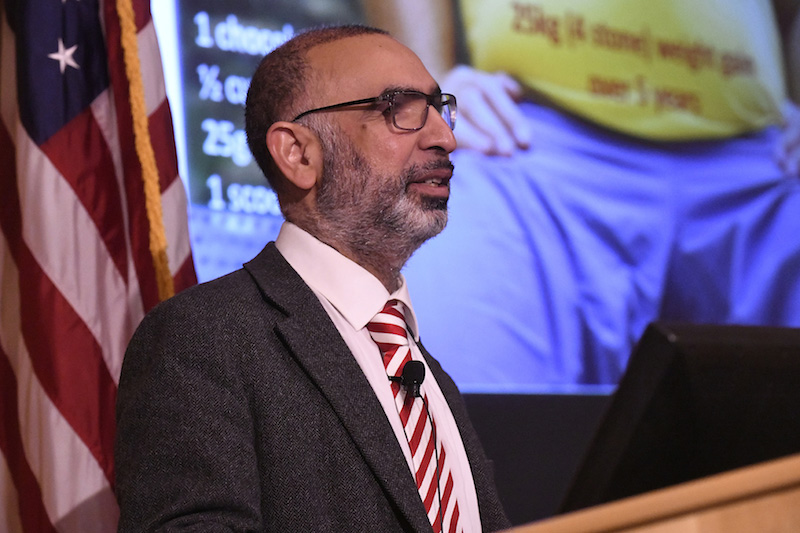Obesity is considered one of the biggest health challenge of the modern era, according to Professor of Medicine Dr Shahrad Taheri during the latest Grand Rounds lecture at Weill Cornell Medicine-Qatar (WCM-Q). Dr Taheri is an expert on obesity and diabetes, and is also the Director of Clinical Research Core at WCM-Q.

Speaking to an audience of students and fellow health professionals, Dr Taheri said that Qatar is in a region with some of the highest levels of overweight cases and obesity in the world – 76.6% of people are overweight or obese and 42% are obese.
What is most alarming is the prevalence of obesity in children. The high prevalence of obesity in adults and children in Qatar are comparable to those observed in some regions of the United States.’
Dr Taheri showed recent figures showing that 21.5% of children in Qatar aged five to 19 years old are obese, a level that he says is all the more concerning because research has shown that most children tend not to outgrow obesity, but instead carry it into adulthood.
We know very clearly that people who are obese lose years from their life. If someone is obese at the age of 40, they will lose six to seven years of life. If they are obese and they smoke it can be estimated that they will likely live 13 to 14 years less than normal weight non-smokers.’
 Complications such as diabetes, cardiovascular disease and cancer add to the reduced longevity caused by obesity. According to Dr Taheri, obesity should be considered a chronic disease that requires lifelong management to keep it under control. The most effective means for the management of obesity include weight loss strategies, weight loss maintenance, bariatric surgery and various forms of medication. Dr Taheri stressed that both low-carbohydrate and low-fat diets can lead to significant weight loss of 6-7 kg after 12 months, but there was little clinical difference between the results produced by following different well-known diets.
Complications such as diabetes, cardiovascular disease and cancer add to the reduced longevity caused by obesity. According to Dr Taheri, obesity should be considered a chronic disease that requires lifelong management to keep it under control. The most effective means for the management of obesity include weight loss strategies, weight loss maintenance, bariatric surgery and various forms of medication. Dr Taheri stressed that both low-carbohydrate and low-fat diets can lead to significant weight loss of 6-7 kg after 12 months, but there was little clinical difference between the results produced by following different well-known diets.
The key is to follow a nutrition programme that you are able to sustain in the long-term.’
According to research, patients who had the most success in their weight loss efforts were those who attended all of their appointments with their healthcare professional, adhered to prescribed calorie restriction, increased their physical activity and used meal replacements to support their weight loss efforts. But the most important factor for long-term success was shown to be significant weight loss early in the programme.
Those who demonstrate early weight loss are the most likely to succeed in the long-term. If someone has lost ten percent of their body weight in the first year, they are 10.4 times more likely to have maintained that weight loss after four years.’
Patients who manage to achieve significant long-term weight loss have vastly improved healthcare outcomes, said Dr Taheri. Evidence proved that Type 2 diabetes can be reversed by adopting positive lifestyle behaviours such as eating a healthy diet, increasing physical activity and losing weight.
You are much more likely to be successful in your efforts to lose weight, maintain a healthy weight, and improve your health if you treat obesity or overweight as a serious issue. Ask your doctor for help – you do not have to do this alone and there are effective approaches to help you succeed.’
The lecture titled ‘The Pathophysiology and Management of Obesity’, was accredited locally by the Qatar Council for Healthcare Practitioners-Accreditation Department (QCHP-AD) and internationally by the Accreditation Council for Continuing Medical Education (ACCME).
For updates and more information about the Grand Rounds lecture at WCM-Q, visit qatar-weill.cornell.edu.




